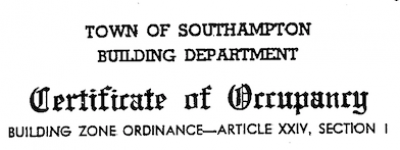Home Sales May Need New C of O

Homebuyers in the Town of Southampton will need to obtain updated certificates of occupancy if the town board moves forward with a proposal that would mandate it.
Lawyers often recommend that buyers get an updated C of O before closing, and some lenders require it, but the current town code does not. In response to a suggestion from the town attorney’s office, town officials — looking, among other things, for illegal apartments and similar code violations — are considering amending the code. The amendment would ensure that an inspection take place before the sale.
The latest draft of the legislation, last discussed during a public hearing on Feb. 14, allows for some exceptions. If a property is moved from an individual’s name to a partnership’s, or changes hands for estate purposes, an updated C of O would not be required.
According to the town attorney’s office, the villages of Southampton, Sag Harbor, North Haven, Westhampton Beach, and East Hampton already have this law on the books, with no exemptions. The Town of East Hampton does not have the requirement.
Southampton Supervisor Jay Schneiderman said he looks at the proposal as a “consumer protection bill.” People buying properties without a C of O can find themselves responsible for bringing it up to code, he said, often an expensive process. One new owner, for example, discovered his lot had been overcleared and had to spend $50,000 to revegetate.
Councilwoman Christine Scalera, who is an attorney, said “the intent was good,” in that the law would bring properties into compliance. However, she said, she is concerned about unintended consequences and wants the Southampton Business Alliance to weigh in.
Sheryl Heather, executive director of the alliance, said yesterday that the matter was under review. “On face value, the proposal looks like a good consumer protection plan, and on face value it looks good for local business, as it will give work to tradespeople doing home repairs or upgrades,” she said. “But we’re taking a close look at what might be hidden or unintended negative consequences.”
An updated certificate of occupancy costs $200. Leonard Marchese, the town comptroller, said yesterday that an additional $250,000 was included in the 2017 budget in anticipation of its becoming law.
One issue, according to Kathryn Garvin, the town attorney handling the proposal, is that there is no provision for enforcement. If the law is violated, there is no fine or punishment. “Let’s say I sold my house to you,” she said. “The town does not find out about the transfer of property for months.” (Only the seller has the right to request an updated C of O.) “By the time that happens, you own the property. If I didn’t get an updated certificate of occupancy, the town can’t do anything to me, because I don’t own it anymore.”
Part of the legislation’s intent, she said, is to help buyers demand an updated C of O from sellers reluctant or unwilling to provide one.
Ms. Scalera also raised concerns about the proposed exemption for partnerships. “I don’t think we should be encouraging that kind of transfer that shields and hinders prosecution,” she said, suggesting that the legislation should be crafted not only to protect buyers, but also to strengthen the code.
“I would want to look at that exemption a little more closely,” she told the town board at last week’s meeting.
One Water Mill resident said that the new law would affect everyone. “There’s no wider net you can cast,” he said. “I know we’re all immortal, but at some point in the game, we’re going to sell those homes.” He objected to the proposal, which he called anti-homeowner, saying it was more an insurance policy than anything. “I don’t think my town should be in the insurance business,” he said, adding that any difficulties should be resolved between the buyer and the seller. “This is a solution in search of a problem.”
The proposal has the support of the Building Department, which could be tasked with as many as 1,000 new inspections annually. At least one resident has complained that backlog in the building inspector’s office could delay inspections, which would then delay closings, jeopardizing sales and creating a hardship for the seller.
Mr. Schneiderman said the chief building inspector has indicated he has adequate staff to handle the extra workload.
John Bouvier, a town board member, said the town had received mixed responses, and he too wanted more time to study the proposal.
The public hearing was adjourned until March 28, when the board will meet at 6 p.m. at the Hampton Bays Senior Citizen Center.
